Graduate
Will you be here next year fall?
Rebeca Mata Barboza Biological Systems Engineering Graduate Group
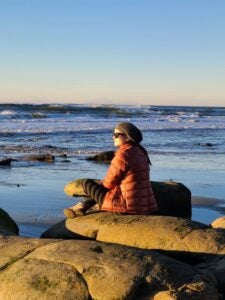 Ever since I was a little, I’ve always been passionate and curious about food production. Over time I became more and more interested in learning about and finding alternative and sustainable ways to grow food and feed a rapidly growing global population. My passion led me to study Agricultural Engineering where, looking for alternative systems to produce food, I fell in love with marine and coastal ecosystems. These ecosystems have huge potential, especially in countries where coastal communities live in some degree of poverty.
Ever since I was a little, I’ve always been passionate and curious about food production. Over time I became more and more interested in learning about and finding alternative and sustainable ways to grow food and feed a rapidly growing global population. My passion led me to study Agricultural Engineering where, looking for alternative systems to produce food, I fell in love with marine and coastal ecosystems. These ecosystems have huge potential, especially in countries where coastal communities live in some degree of poverty.
In Costa Rica, I attended the University of Costa Rica and worked for a couple of years with seaweed production before enrolling at UC Davis in 2016 to pursue my Ph.D. in Biological and Agricultural Engineering. As a Ph.D. candidate, my research involves the effects of climate change on marine aquaculture, focusing on primary producers and the consequent downstream trophic impacts on primary consumers important in marine aquaculture like abalone, oysters, etc.
I hope to use all the knowledge and experience, acquired during my education, in Costa Rica and work with coastal communities to develop sustainable food production systems accessible to everyone and alleviate poverty and contribute to the country’s food security.
Alex Wright Animal Biology Graduate Group
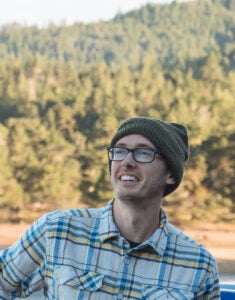 As a former marine biologist, I recognize the increasing need for sustainable and healthy seafood options. After graduating from the University of Delaware with a BS in marine biology, I spent several years working as a biologist aboard fishing vessels along the Mid Atlantic coast and around the Florida panhandle. I worked with a wide variety of fisheries stakeholders—commercial fishers, seafood distributors, recreational anglers—in a coordinated effort to collect biological data and information concerning fisheries. Consumer demand for seafood is growing–it is imperative that, as a nation, we secure a sustainable and reliable source of seafood. In the face of climate change and strained wild-fisheries, aquaculture is an important component essential to meeting this demand for seafood.
As a former marine biologist, I recognize the increasing need for sustainable and healthy seafood options. After graduating from the University of Delaware with a BS in marine biology, I spent several years working as a biologist aboard fishing vessels along the Mid Atlantic coast and around the Florida panhandle. I worked with a wide variety of fisheries stakeholders—commercial fishers, seafood distributors, recreational anglers—in a coordinated effort to collect biological data and information concerning fisheries. Consumer demand for seafood is growing–it is imperative that, as a nation, we secure a sustainable and reliable source of seafood. In the face of climate change and strained wild-fisheries, aquaculture is an important component essential to meeting this demand for seafood.
My personal research interests and objectives fall under the theme of assisting commercial aquaculture to become more efficient and sustainable at producing seafood, while also optimizing animal health and welfare. Specifically, I am involved with our statewide aquaculture survey that aims to gain insight into animal health needs and the use of antimicrobial products within the aquaculture industry. The journey to my Ph.D. will provide many learning opportunities and allow me to make several contributions towards the continuous advancement of U.S. aquaculture.
Sandy Lokuhitige Animal Biology Graduate Group
Ayodeji Fagbohun Animal Biology Graduate Group
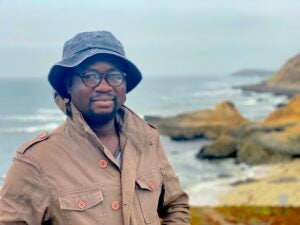 Ayodeji earned his bachelor’s degree in aquaculture and fisheries management from the Federal University of Agriculture in Abeokuta, Nigeria, and then went on to the Department of Fisheries and Aquaculture Technology at the Federal University of Technology in Akure, Nigeria, for his master’s degree in aquaculture. Over the last 5 years as a lecturer and researcher at the Federal College of Agriculture in Akure, Nigeria, he has undertaken various studies on catfish nutrition and reproduction. His study as a doctoral student at UC Davis will focus on identifying cost-effective diet formulations for white sturgeon and making dietary recommendations to producers and feed manufacturers. The goal of his research will address general aquaculture issues on nutrition, aquatic animal welfare, product quality, and consumer acceptance.
Ayodeji earned his bachelor’s degree in aquaculture and fisheries management from the Federal University of Agriculture in Abeokuta, Nigeria, and then went on to the Department of Fisheries and Aquaculture Technology at the Federal University of Technology in Akure, Nigeria, for his master’s degree in aquaculture. Over the last 5 years as a lecturer and researcher at the Federal College of Agriculture in Akure, Nigeria, he has undertaken various studies on catfish nutrition and reproduction. His study as a doctoral student at UC Davis will focus on identifying cost-effective diet formulations for white sturgeon and making dietary recommendations to producers and feed manufacturers. The goal of his research will address general aquaculture issues on nutrition, aquatic animal welfare, product quality, and consumer acceptance.
Natalie Rizzo Animal Biology Graduate Group
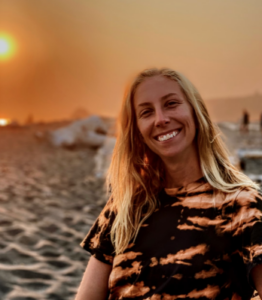 Despite growing up in the Midwest, I have always loved the oceans. Family trips to the coastlines sparked my interest in marine species at a young age. When I finally moved to California and scuba-dived in the kelp forests, I knew I wanted to pursue a career involving the Pacific coastline.
Despite growing up in the Midwest, I have always loved the oceans. Family trips to the coastlines sparked my interest in marine species at a young age. When I finally moved to California and scuba-dived in the kelp forests, I knew I wanted to pursue a career involving the Pacific coastline.
For the past five years, I have worked in marine sciences in Los Angeles, learning about our native species and how they fit into our seafood economy. Seafood has increased in popularity and with this rise, we have seen unsustainable fishing practices and black market fisheries grow. Observing this has propelled my desire to make a change in how our seafood is obtained. In California, we have nutrient-rich waters as well as some of the largest biodiversity on the planet, yet the marine aquaculture industry is still developing. As seafood grows in popularity, we must promote sustainable aquaculture techniques that allow for nutrient cycling through polyculture. This type of farming supports the economic demand in a sustainable way that also benefits wild ecosystems. I am interested in studying the nutrient cycling of low trophic aquaculture systems, seaweeds, and invertebrates, and how this can further develop the seafood industry.
My research objectives align with furthering the development of marine aquaculture systems and defining the idea of sustainability. I want to continue the movement towards seaweed and bivalve polyculture by designing systems that enhance our wild ecosystems while benefiting the seafood industry.
Jennifer Bowman Animal Biology Graduate Group
Sam Beckert Animal Biology Graduate Group
Undergraduate
Rebecca (Chen-Shu) Lin
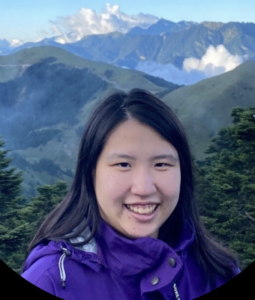 I’m a senior undergraduate student majoring in Sustainable Agriculture and Food Systems at UC Davis. My current project with Dr. Gross is to develop a decoupled aquaponics system that uses recirculating aquaculture system as the foundation to provide nutrient-dense fish affluent for crops growing in greenhouse 84. I also help with germination trials for plants growing in various soil-less media, such as walnut shells and coconut husks. I’m passionate about CEA and would like to work in the aquaponics industry in the future!
I’m a senior undergraduate student majoring in Sustainable Agriculture and Food Systems at UC Davis. My current project with Dr. Gross is to develop a decoupled aquaponics system that uses recirculating aquaculture system as the foundation to provide nutrient-dense fish affluent for crops growing in greenhouse 84. I also help with germination trials for plants growing in various soil-less media, such as walnut shells and coconut husks. I’m passionate about CEA and would like to work in the aquaponics industry in the future!
Alumni
Alexes Juarez
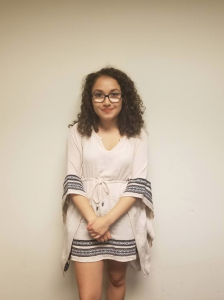
My general interest is in conservation ecology within the scope of climate change. I am just beginning my third year as an undergraduate in the Evolution, Ecology, and Biodiversity major and would like to go to graduate school and focus my research on invasive species. My current project with Dr. Gross is to develop a detection methodology for pathogens (Vibrio vulnificus and Vibrio parahaemolyticus) within a Giant Keyhole Limpet culture system. In particular, we are working with a private company that is developing culture techniques to grow and produce limpets and maximize KLH (keyhole limpet hemocyanin) levels within their animals. KLH is an area of interest because it is a carrier protein for cancer vaccines. Since KLH does not create an immune response in patients, it is being researched for its pharmaceutical potential in human health such as breast and bladder cancers, non-Hodgkins lymphoma, and cutaneous melanoma.
Kellen Parrish
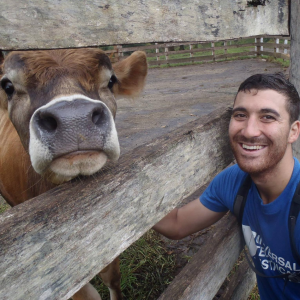 My research is focused on determining sustainable methods for recycling water and recapturing aquaculture solid wastes to repurpose them as fertilizers. I currently work on a large aquaculture farm in California’s Central Valley where we are evaluating the feasibility of different waste and water recovery methods from aquaculture effluent.
My research is focused on determining sustainable methods for recycling water and recapturing aquaculture solid wastes to repurpose them as fertilizers. I currently work on a large aquaculture farm in California’s Central Valley where we are evaluating the feasibility of different waste and water recovery methods from aquaculture effluent.
I focus on the utilization of aquaculture effluents because they carry valuable nutrients that can be utilized elsewhere in food production streams. This research is applicable on a global scale with aquaculture and I’m interested in developing the concept of aquaculture as an agricultural system with two outputs, fertilizer and animal products. From here, the models developed for different systems can be scaled up, down or modified depending on the resource constraints of a given area. As aquaculture continues to grow, so will its waste outputs that can be converted from liability to asset with a little bit of planning and design!
Geoffrey Mangalam
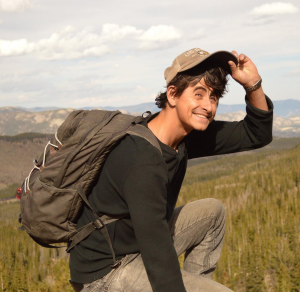
I am a fifth-year undergraduate student majoring in Sustainable Agriculture and Food Systems. My main interests lie in greenhouse production as well as other decentralized food systems such as community gardens, edible landscapes, and CSAs.I currently work with Dr. Gross on conducting administrative tasks such as purchasing, meeting scheduling, and website maintenance. In addition, I am assisting in the design and construction of a research-focused decoupled aquaponics system at UC Davis West Campus. I also conducted studies evaluating the utility of aquaculture effluent in the production of food-grade Lemna sp. (duckweed) as an alternative protein source. I also currently work at the Western Institute for Food Safety and Security (WIFSS), wherein my first year at UC Davis I helped conduct an assessment of Zoonotic risks (Salmonella enterica) in aquaponic lettuce production. This research will hopefully contribute to the establishment of Good Agricultural Practices for aquaponics.
Devon Maddex
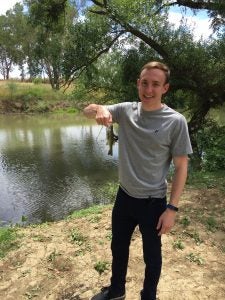
I am a third-year undergraduate Animal Science major with a pre-veterinary focus. My areas of interest are pretty broad and revolve around animal science, but I am really fascinated by exotic animals and wildlife. Dr. Gross has introduced me to the environmental and conservation side of animal science which has influenced the topics I want to research. My current research with Dr. Gross involves fish progenitor germ cells with the goal of learning more about their functions and the potential for bioengineering. This technology has countless applications, but we will be primarily working on implanting progenitor germ cells of one fish species into a surrogate in efforts to conserve fish populations, re-establish endangered species, or increase aquaculture production.
